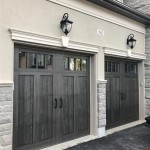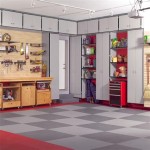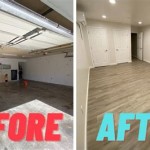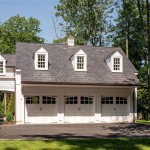Average Cost to Convert a Garage Into an Apartment: A Comprehensive Guide
Converting a garage into an apartment, often referred to as an accessory dwelling unit (ADU), can be a valuable investment, offering potential rental income, increased property value, or a dedicated space for family members. However, understanding the associated costs is crucial before embarking on such a project. These costs can vary significantly depending on location, the garage's existing condition, the desired finishes, and local building codes and regulations.
This article provides a detailed overview of the average cost to convert a garage into an apartment, breaking down the various factors that contribute to the overall expense. It will explore the different stages of the conversion process and outline the associated costs for each.
Key Cost Factors Influencing Garage Conversion Projects
Several factors can significantly impact the total cost of converting a garage into an apartment. These include: the size of the garage, the extent of required structural modifications, the level of desired finishes, plumbing and electrical work necessary, and local permit and inspection fees.
The garage's size directly correlates with the amount of materials and labor required. A larger garage will naturally necessitate more materials for framing, insulation, flooring, and drywall. Similarly, a larger space will require more extensive electrical and plumbing systems to meet the needs of a fully functional apartment.
Structural modifications can dramatically increase costs. If the garage requires foundation repairs, roof modifications, or significant re-framing to meet building codes, this can add a substantial expense to the project. Garages are often not built to the same standards as habitable dwellings, and therefore may require significant structural upgrades.
The level of desired finishes also plays a crucial role. High-end appliances, custom cabinetry, premium flooring, and designer fixtures will all contribute to a higher overall cost. Opting for more budget-friendly options can help to keep costs down.
Plumbing and electrical work are essential components of a garage conversion. Adding a bathroom and kitchen requires running new pipes, installing fixtures, and connecting to the existing sewer system. Similarly, the electrical system must be upgraded to handle the increased load of appliances, lighting, and potentially heating and cooling systems. These are specialized trades, and professional services are necessary to ensure safety and compliance with building codes.
Finally, local permit and inspection fees can vary widely depending on the jurisdiction. Obtaining the necessary permits before starting construction is crucial to avoid fines and delays. These permits cover various aspects of the project, including building, electrical, plumbing, and mechanical systems. Regular inspections are also required to ensure that the work meets local building codes.
Detailed Breakdown of Conversion Costs
To better understand the overall cost of a garage conversion, it is helpful to break down the project into its various stages and examine the associated expenses for each. These stages typically include planning and design, structural work, plumbing and electrical, insulation and drywall, flooring and finishes, kitchen and bathroom, and permits and fees.
Planning and Design: This initial stage involves hiring an architect or designer to create plans for the conversion. These plans must meet local building codes and regulations and will serve as the blueprint for the entire project. The cost for planning and design can range from $2,000 to $8,000, depending on the complexity of the project and the experience of the professional hired.
Structural Work: As previously mentioned, structural work can significantly impact the overall cost. This may involve reinforcing the foundation, upgrading the roof, adding new walls, or changing window and door openings. The cost for structural work can range from $5,000 to $20,000 or more, depending on the extent of the modifications required.
Plumbing and Electrical: Installing new plumbing and electrical systems is essential for a habitable apartment. This includes running new pipes for water and sewer, installing fixtures, upgrading the electrical panel, adding outlets and lighting, and connecting appliances. The cost for plumbing and electrical work can range from $8,000 to $20,000, depending on the size of the apartment and the complexity of the systems.
Insulation and Drywall: Proper insulation is crucial for energy efficiency and comfort. Insulating the walls, ceiling, and floor will help to regulate temperature and reduce energy bills. Drywall provides a smooth, paintable surface for the walls and ceiling. The cost for insulation and drywall can range from $4,000 to $10,000, depending on the type of insulation used and the size of the space.
Flooring and Finishes: The choice of flooring and finishes can significantly impact the overall look and feel of the apartment. Options range from budget-friendly vinyl and laminate to more expensive hardwood and tile. The cost for flooring and finishes can range from $3,000 to $15,000 or more, depending on the materials selected and the size of the space.
Kitchen and Bathroom: Installing a kitchen and bathroom are essential components of a functional apartment. This includes cabinets, countertops, appliances, sinks, toilets, showers, and bathtubs. The cost for a kitchen and bathroom can range from $10,000 to $30,000 or more, depending on the quality of the materials and fixtures selected.
Permits and Fees: Obtaining the necessary permits and paying associated fees is a crucial part of the garage conversion process. These fees can vary widely depending on the location and the scope of the project. The cost for permits and fees can range from $1,000 to $5,000 or more.
Regional Cost Variations and General Averages
The cost of converting a garage into an apartment can vary significantly depending on the geographic location. Areas with higher labor costs and material prices will generally have higher conversion costs. Urban areas tend to be more expensive than rural areas, and states with stricter building codes may also have higher costs.
As a general guideline, the average cost to convert a garage into an apartment can range from $50 to $200 per square foot. This means that a standard two-car garage, which is typically around 400 to 600 square feet, could cost between $20,000 and $120,000 to convert. However, this is just an estimate, and the actual cost can vary significantly depending on the factors outlined above.
In areas with lower labor and material costs, it may be possible to complete the conversion for less than $50 per square foot. Conversely, in high-cost areas, the cost could easily exceed $200 per square foot. It is essential to obtain multiple quotes from qualified contractors in the area to get a more accurate estimate of the potential cost.
Furthermore, the final cost can be increased with unforeseen events. If the garage is older, hidden structural problems may be discovered during the renovation. These may be in the form of rotting wood, plumbing issues, electrical problems, and more. These costs are outside of the original project, and can quickly add to the total cost of renovation.

Cost To Remodel A Garage Conversion Fixr

Converting Garages For Cars Into Housing People Transfers

Consider This Before You Convert Your Garage Into A Room Patio

Garage Conversion 101 How To Turn A Into Living Space Maxable

How Much Does A Garage Conversion Cost 2024 Data Angi

Garage To Apartment Conversion 3 Things Know

Diy How To Turn A Garage Into Studio Apartment With Shiplap Metal

How To Convert A Garage Into Living Space Sweeten Com

How To Convert A Garage Living Space Cost Permits Conversion Steps

How Much Does A Garage Conversion Cost 2024
Related Posts








